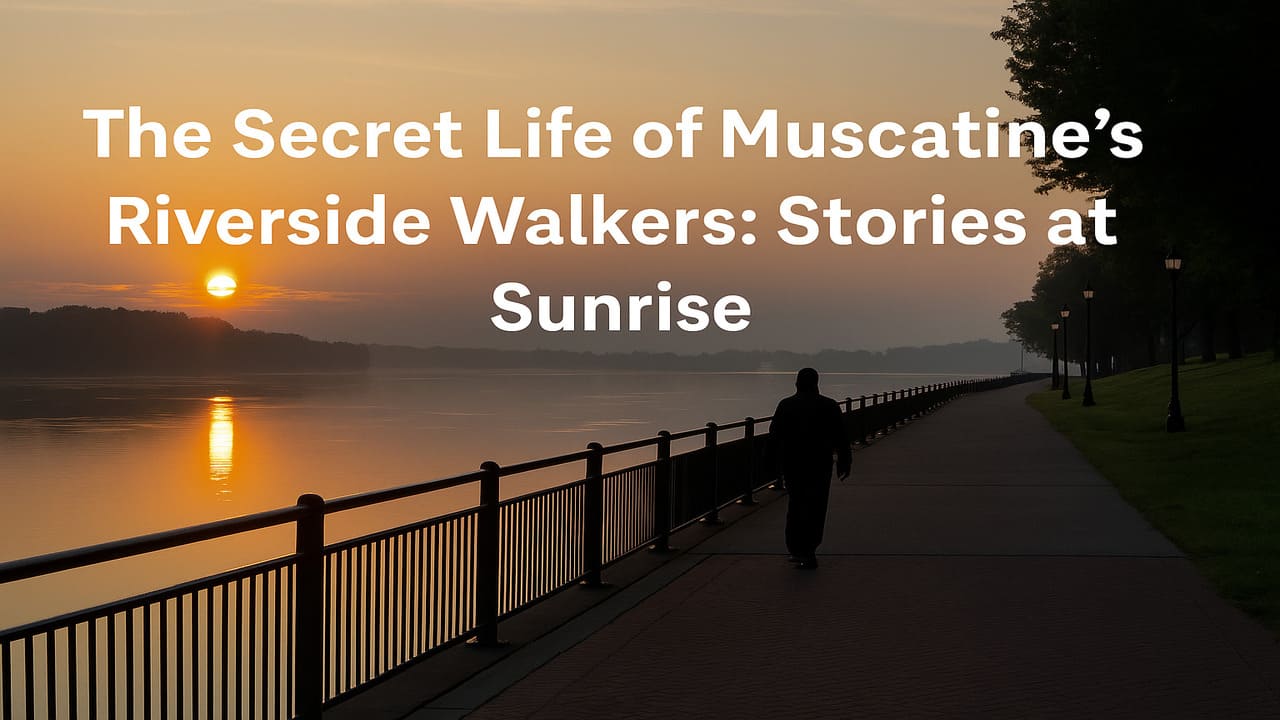
Meet Muscatine – When the rest of Muscatine is still wrapped in sleep and the town’s iconic riverfront appears shrouded in morning mist, a quiet ritual unfolds. It’s not listed on travel guides or town brochures, but to those who witness it, this routine is sacred. Here, along the winding Mississippi River, the secret life of Muscatine’s riverside walkers comes alive revealing a culture of quiet resilience, reflection, and unexpected connection.
Situated in southeastern Iowa, Muscatine is often known for its pearl-button legacy, brick-paved downtown, and charming community spirit. But the riverside walkways along the Mississippi host a lesser-known narrative one that begins just after dawn.
As the first hints of pink and orange break over the river, figures begin to appear. Some are brisk and goal-oriented, donning headphones and counting steps. Others meander, coffee in hand, savoring the stillness. These are Muscatine’s riverside walkers residents from all walks of life who choose the morning as their sacred time.
Also Read : Main Street Rhythms: Local Shops, Street Musicians, and Passing Trains
The people of Muscatine don’t just walk for fitness. For many, these early hours represent something deeper a transition point between sleep and obligation, between yesterday’s thoughts and today’s decisions.
Retired teacher Margaret Donnelly walks the same stretch each morning. “At sunrise, the town feels like it belongs to you,” she says. “Before the noise begins, before people check their phones, there’s this space for peace.”
For others, the riverside becomes a moving confessional. Local chef Ray Munroe admits, “It’s where I rehearse conversations, think through recipes, and sometimes just walk off the stress. No one judges at 6 a.m.”
Though the experience is often solitary, it’s also quietly communal. Walkers nod in passing, share a knowing glance, or occasionally stop to exchange a few words about the sunrise, the water’s movement, or the returning geese.
“There’s this woman I’ve seen every Tuesday for five years,” says Enrique, a nurse at the local hospital. “We’ve never exchanged names, but we wave every time. When she didn’t show up for two weeks, I was worried. Then when she returned, she smiled and held up her wrist she’d broken it. No words. Just a moment of mutual relief.”
That’s the hidden beauty of this riverside culture: it runs on recognition more than conversation, presence over performance. It’s a secret life in the truest sense quiet, understated, and profoundly meaningful.
Studies show that walking near water often called “blue space walking” can reduce stress and enhance mental clarity. In Muscatine, many locals say they feel this benefit intuitively.
Veteran Paul R., who walks after his night shifts, says the riverside has become a kind of therapy. “Some mornings I don’t even remember what I thought about I just know I feel better after.”
The city itself has responded to this culture by maintaining the walkways, placing benches at intervals, and even adding small signs with quotes about nature, time, and stillness.
Read More : Blackmores Supplement Allegedly Triggers Nerve Damage, Here’s the Company’s Response
What’s fascinating is how the riverside tradition spans generations. Teen joggers sometimes pass retirees with canes. A father may be seen pushing a stroller while his child clutches a piece of toast. Writers come with notebooks, artists with sketchpads, and photographers with long lenses trying to catch the perfect reflection of the bridge.
Local high schooler Lily H. keeps a morning sketchbook of what she sees: “The same tree in different skies. Birds flying low. An old man who feeds ducks every Friday.”
It’s not a coincidence this secret life is lived by those who make time for it. It’s not forced, it’s not loud, but it’s entirely alive.
What makes Muscatine’s riverwalk unique is how the Mississippi isn’t just scenery it’s a living force. The river changes every morning: sometimes still and reflective, sometimes brown and rushing with summer rains. These walkers adapt with it.
Seasonal shifts affect the flow of conversations and the type of walkers you’ll see. In winter, only the most dedicated show up, wrapped in scarves. Spring brings new faces, fresh resolutions, and sunlit benches once again filled.
The river becomes a mirror not just of sky and trees, but of Muscatine itself.